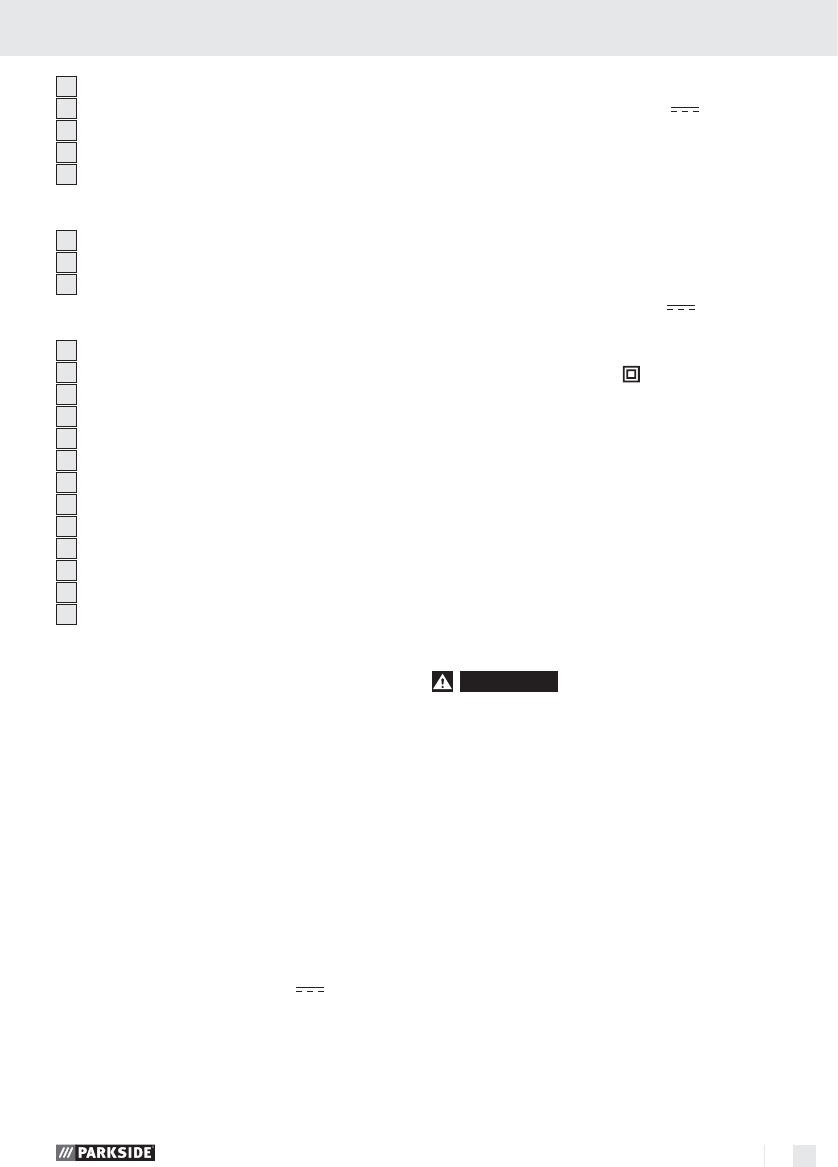
7 GB/IE/CY
Introduction
3
Battery pack
4
Metal stirrup hanger
5
Clamping nut
6
Spigot nut
7
Spindle lock
Battery charger (see Fig. A):
8
Charging cradle
9
Mains adapter
10
LED
Accessories (see Fig. B):
11
6 HSS drills
12
2 Mandrels for mounting tools
13
3 Polishing wheels
14
4 Grinding wheels
15
1 Metal brush
16
1 Saw blade
17
10 Cutting wheels
18
5 Collets
19
2 Plastic brushes
20
2 Engraving bits
21
3 Milling bits
22
5 Grinding bits
23
Combination tool
©
Included items
1 Cordless multi-grinder with rechargeable
battery pack
1 Charging cradle
1 Mains adapter
1 Plastic case
1 Accessory kit (45-piece)
1 Operating instructions
©
Technical information
Model PFBS 9.6 - KH 3125:
Rated voltage: 9.6 V DC
No-load speed: n
0
5000 - 25000 min
-1
Max. disc ø: 25 mm
Rechargeable battery pack PFBS 9.6-2:
Rated voltage: 9.6 V DC
Capacity: 1000 mAh NI-MH
Battery charger PFBS 9.6-1:
Primary:
Rated voltage: 230 V
~
50 Hz
Rated output: 8.5 W
Secondary:
Rated voltage: 12 V DC
Charging current: 400 mA
Charging duration: approx. 3 hours
Protection class: II /
Noise and vibration data:
Measured values for noise are determined in accord-
ance with EN 60745. The A-weighted noise level
of the electrical power tool are typically:
Sound pressure level: 61 dB(A)
Sound power level: 75 dB(A)
Uncertainty K: 3 dB
Evaluated acceleration, typical:
Hand / arm vibration: 2,63 m / s
2
Uncertainty K = 1,5 m / s
2
WARNING!
The vibration level given in
these instructions has been measured in accordance
with a standardised measurement procedure specified
in EN 60745 and can be used to compare devices.
Different uses of the device give rise to different
vibration levels and in many cases they may exceed
the values given in these instructions. It is easy to
underestimate the vibration load if the electrical pow-
er tool is used regularly in particular circumstances.
Note: If you wish to make an accurate assessment
of the vibration loads experienced during a particular
period of working, you should also take into account
the intervening periods of time when the device is
switched off or is running but is not actually in use.
This can result in a much lower vibration load over
the whole of the period of working.


















